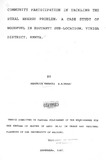Community participation in tackling the Rural energy problem: a case study of Woodfuel in Ebutanyi sub-location, Vihiga District, Kenya

View/
Date
1997-09Author
Wamboyi, Beatrice
Type
ThesisLanguage
enMetadata
Show full item recordAbstract
The importance of woodfuel as a traditional source
of energy and its increasing shortage in terms of supply and
demand has made it necessary for a number of scholars to
assess the situation in many parts of the world.
Notwithstanding the several studies done and solutions
suggested, the problem is still looming high. The central
argument, therefore is that a new approach to the fuel wood
crisis urgently needed. This new approach as articulated
by, inter alia, Chambers et.al (1989),
(1988), Hosier (1988) and Soussan (1988)
Hall (1983), Chambers
emphasizes that it is
imperative to listen to the local people who are the intended
beneficiaries of any project and that it is essential for
project planners to recognize and understand the methods that
local farmers have evolved and adopted for managing rural
development including tree planting. It was on the basis of
this approach that the study was undertaken to involve the
Ebutanyi sub-location community in the identification of
viable ways of tackling the wood fuel problem.
The study presupposes that the energy problem in the
rural areas can be effectively handled if the people
themselves will be involved in identifying viable ways-ways
within their reach of tackling the problem first and foremost before
any other step is taken. In essence, the rural energy
problem should not be looked at in isolation but as an
intricate aspect of rural poverty.
Although the study area lies in a high agricultural
potential area, data analysis revealed a weak household
economic base that was reflected by low income levels,
occupation structures, low energy use technology and the
agricultural practises that were in place. This trend has
greatly impaired the farm households to ability afford
alternative energy sources which has resulted in
overdependence on fuelwood. It was on the basis of these weak
economic base that the community advocated strongly for the
adoption of energy saving technologies and supply enhancing
programmes like agro-forestry as not just short term
intervention approaches but also the most important step. As
a long term measure energy diversification should be
encouraged through programmes that will increase income levels
of the people hence be able to afford alternatives like solar,
biogas or electricity,.
Finally, it must be realised that the approach to the
alleviation of woodfuel shortage should be a package deal
geared at alleviating rural poverty.
Citation
M.A.Publisher
Department of Urban and Regional Planning, University of Nairobi
Description
Master of Arts (M.A.) in Urban and Regional Planning
